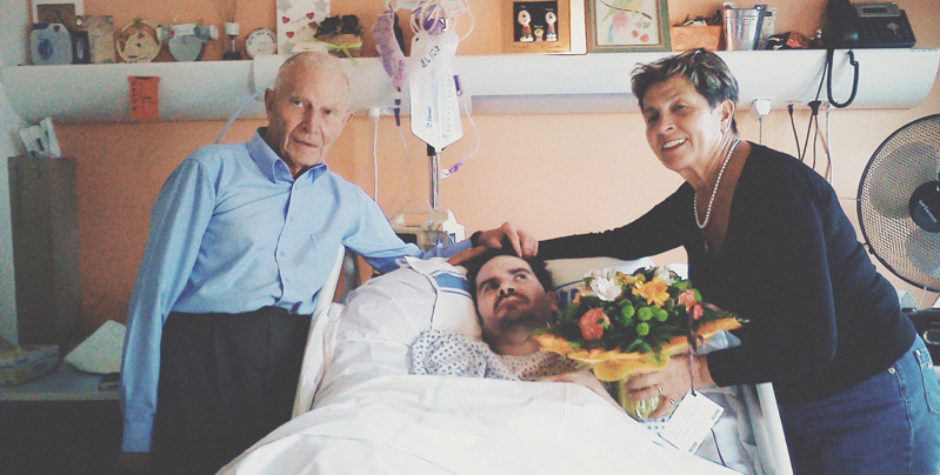

Vincent Lambert: A Victory for Disabled Persons and for International Law
Lambert: the disabled & law's victory
Early in the morning of May 20th, without waiting for his family to kiss him goodbye one last time, Dr Sanchez sedated Vincent Lambert to profoundly anaesthetize him, and simultaneously removed his hydration and nutrition to provoke his death. His agony, and the distress of his parents, followed live by the French, were to last the whole week.
Yet, last May 3rd, the UN Committee on the Rights of Persons with Disabilities, which had received an application by the Lambert parents at the initiative of the ECLJ, had asked France, as interim measures, to “take the necessary measures to ensure that Mr Vincent Lambert’s enteral nutrition and hydration are not suspended while the Committee is processing his case.”
On May 10th, the parents were informed of the refusal of the French government to comply with the UN request, and that the euthanasia of their son would start on May 20th. The Government claimed that the Committee’s request was not binding.
France has yet ratified the Convention on the Rights of Persons with Disabilities and its Optional Protocol. The Protocol instructed the Committee on the Rights of Persons with Disabilities to ensure compliance by States with the Convention, and gave it the power to receive “individual complaints” - such as the application of the Lambert parents - and to request the compliance with interim or protective necessary measures.
On May 17th, the Committee on the Rights of Persons with Disabilities reminded the French Government of its obligations, again indicating that “in accordance with Rule 64 of the Committee’s Rules of Procedure, the State party has been reminded today take the necessary steps to ensure that nutrition and hydration are not suspended while the Committee is processing his case.”
On the same day, the “Défenseur des droits”, namely the ombudsman responsible for ensuring the application of this Convention in France declared that “the provisional measures requested by the United Nations committees must be respected by the State, at the risk of hindering the exercise of the right of complaint under the Optional Protocol.”
The administrative and district courts were seized, in vain, to judge the compliance with the law of the refusal of the French authorities. The administrative court adopted the government’s position, while the district court declared itself incompetent.
Even the European Court, lodged with an emergency application on May 20th, discarded itself in a few hours. It merely said that it saw no new fact likely to reconsider its previous decision of 2015, in which it had opted for the death of Vincent Lambert. In so judging, the ECHR not only abandoned Vincent Lambert once again to death, but also weakened the authority of its own interim measures. It informed the press of its decision 30 minutes before the start of a new hearing of the case, before the Court of Appeal of Paris.
At the start of the hearing before the Court of Appeal, the whole French public opinion was convinced that Vincent was lost. Except his defenders.
After two hours of pleading and two more hours of deliberations, the Court of Appeal gave its judgment: life.
There was then tremendous joy among the supporters of Vincent Lambert, a clap of thunder in the whole media, and consternation among the supporters of Vincent’s death.
The Court of Appeal was convinced by our demonstration of the obligation to respect the interim measures requested by the UN. It stated in its judgment: “by freeing itself with the execution of the interim measures requested by the Committee, the French State has taken a decision inapplicable to fall within its prerogatives since it undermines the exercise of a right of which deprivation has irreversible consequences in relation to the right to life”.
The Court ordered the immediate restoration of the nutrition and hydration of Mr. Vincent Lambert. Which is now done.
It is an important victory for disabled persons and international law.
A victory for disabled persons, because Vincent Lambert is neither at the end of his life nor suffering from a serious, an incurable or a degenerative illness, but in a state of altered consciousness after a traumatic brain injury. He is not dying and can still live for many years. According to the testimony of his parents, his friends and leading medical specialists, he breathes alone and has no cardiac assistance; he wakes up in the morning and falls asleep at night. Some of his emotions can be seen on his face. Sunday evening, on the eve of the beginning of the euthanasia, a video showed him crying with his mother.
If he is euthanized, 1.700 other persons in the same state of health could suffer the same fate.
It is also a victory for international law. The authority of the international system of protection of the rights of persons with disability is strengthened. It is certain that if Vincent Lambert’s euthanasia had been completed, France would have been condemned by the United Nations, as other countries already have been. France must not only respect the international Conventions it freely ratified, but it also interpret them with good faith, in the light of their object and purpose (Vienna Convention, 1969). Yet, refusing to apply interim measures is depriving the Convention and, what is more, its Optional Protocol of their purpose of offering disabled persons an effective legal international protection.
But the fight to defend Vincent Lambert is not yet complete. This decision saved Vincent Lambert from imminent death; it spared the country the sight of a slow agony, but it is not yet final. Other pleas are under process, and the proponents of his death persist in making him die.
The first priority is to obtain his transfer to a specialized unit. For years, Vincent has been locked up in his room, in a palliative care service for the dying. Several specialized hospitals have offered to host him, but his doctor and his wife both opposed it because they want him dead.
Beyond, another fight is engaged. That of active euthanasia.
Proponents of this practice want the death of Vincent Lambert, to prove that the State now has power over the lives of the weak, and to convince, through his agony, that it is better to legalize euthanasia, fast and painless.
Once again, it is a question of “granting a merciful death to the patients who, according to human criteria, will have been declared incurable after a critical examination of their state of health”, according to the words used by Adolf Hitler in 1939, in his decree establishing the secret program of extermination of persons with disabilities.











